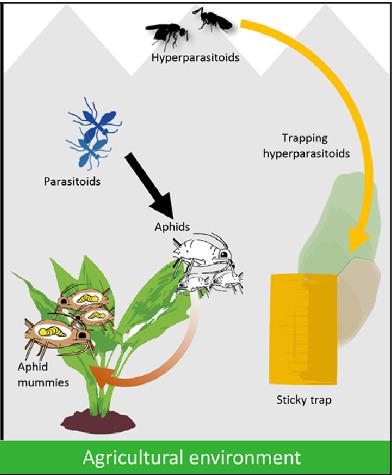当前位置:
X-MOL 学术
›
Pest Manag. Sci.
›
论文详情
Our official English website, www.x-mol.net, welcomes your
feedback! (Note: you will need to create a separate account there.)
Exploiting chemical ecology to manage hyperparasitoids in biological control of arthropod pests.
Pest Management Science ( IF 3.8 ) Pub Date : 2019-12-04 , DOI: 10.1002/ps.5679 Antonino Cusumano 1 , Jeffrey A Harvey 2, 3 , Mitchel E Bourne 1 , Erik H Poelman 1 , Jetske G de Boer 2
Pest Management Science ( IF 3.8 ) Pub Date : 2019-12-04 , DOI: 10.1002/ps.5679 Antonino Cusumano 1 , Jeffrey A Harvey 2, 3 , Mitchel E Bourne 1 , Erik H Poelman 1 , Jetske G de Boer 2
Affiliation

|
Insect hyperparasitoids are fourth trophic level organisms that commonly occur in terrestrial food webs, yet they are relatively understudied. These top-carnivores can disrupt biological pest control by suppressing the populations of their parasitoid hosts, leading to pest outbreaks, especially in confined environments such as greenhouses where augmentative biological control is used. There is no effective eco-friendly strategy that can be used to control hyperparasitoids. Recent advances in the chemical ecology of hyperparasitoid foraging behavior have opened opportunities for manipulating these top-carnivores in such a way that biological pest control becomes more efficient. We propose various infochemical-based strategies to manage hyperparasitoids. We suggest that a push-pull strategy could be a promising approach to 'push' hyperparasitoids away from their parasitoid hosts and 'pull' them into traps. Additionally, we discuss how infochemicals can be used to develop innovative tools improving biological pest control (i) to restrict accessibility of resources (e.g. sugars and alternative hosts) to primary parasitoid only or (ii) to monitor hyperparasitoid presence in the crop for early detection. We also identify important missing information in order to control hyperparasitoids and outline what research is needed to reach this goal. Testing the efficacy of synthetic infochemicals in confined environments is a crucial step towards the implementation of chemical ecology-based approaches targeting hyperparasitoids. © 2019 The Authors. Pest Management Science published by John Wiley & Sons Ltd on behalf of Society of Chemical Industry.
中文翻译:

利用化学生态学来控制节肢动物害虫的生物控制中的超寄生虫。
昆虫超寄生物是第四营养级生物,通常出现在陆地食物网中,但它们的研究相对较少。这些顶级食肉动物可以通过抑制其寄生类寄主的种群来破坏生物害虫的控制,从而导致有害生物的爆发,尤其是在诸如温室之类的密闭环境中,使用增强生物控制。没有有效的环保策略可用于控制超寄生虫。超寄生虫觅食行为的化学生态学方面的最新进展为操纵这些顶级食肉动物提供了机会,从而使生物害虫防治变得更加有效。我们提出了各种基于信息化学的策略来管理超寄生虫。我们建议推挽策略可能是“推”的有前途的方法 超寄生虫远离其寄生虫宿主,并将其“拉”入陷阱。此外,我们讨论了如何使用信息化学试剂来开发创新工具,以改善生物害虫的控制(i)将资源(例如糖和替代宿主)的可及性限制为仅原寄生生物,或(ii)监测作物中超寄生生物的存在以及早发现。我们还确定了重要的缺失信息,以控制超寄生虫,并概述了实现该目标需要进行哪些研究。在密闭环境中测试合成信息化学药品的功效是朝着针对超寄生虫的化学生态学方法的实施迈出的关键一步。©2019作者。约翰·威利父子有限公司(John Wiley&Sons Ltd)代表化学工业协会出版的《害虫管理科学》。
更新日期:2019-12-04
中文翻译:

利用化学生态学来控制节肢动物害虫的生物控制中的超寄生虫。
昆虫超寄生物是第四营养级生物,通常出现在陆地食物网中,但它们的研究相对较少。这些顶级食肉动物可以通过抑制其寄生类寄主的种群来破坏生物害虫的控制,从而导致有害生物的爆发,尤其是在诸如温室之类的密闭环境中,使用增强生物控制。没有有效的环保策略可用于控制超寄生虫。超寄生虫觅食行为的化学生态学方面的最新进展为操纵这些顶级食肉动物提供了机会,从而使生物害虫防治变得更加有效。我们提出了各种基于信息化学的策略来管理超寄生虫。我们建议推挽策略可能是“推”的有前途的方法 超寄生虫远离其寄生虫宿主,并将其“拉”入陷阱。此外,我们讨论了如何使用信息化学试剂来开发创新工具,以改善生物害虫的控制(i)将资源(例如糖和替代宿主)的可及性限制为仅原寄生生物,或(ii)监测作物中超寄生生物的存在以及早发现。我们还确定了重要的缺失信息,以控制超寄生虫,并概述了实现该目标需要进行哪些研究。在密闭环境中测试合成信息化学药品的功效是朝着针对超寄生虫的化学生态学方法的实施迈出的关键一步。©2019作者。约翰·威利父子有限公司(John Wiley&Sons Ltd)代表化学工业协会出版的《害虫管理科学》。


















































 京公网安备 11010802027423号
京公网安备 11010802027423号